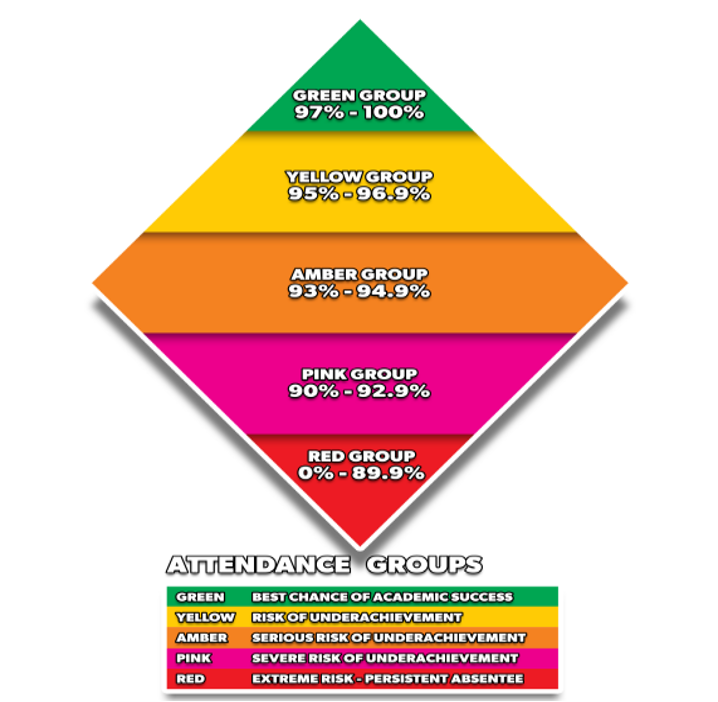Attendance
Attendance information.
Attendance
Attendance information.
Attendance
Attendance information.
Home > Attendance
Improving attendance is everyone’s responsibility. The barriers to accessing education are wide and complex, both within and beyond the school gates, and are often specific to individual students and families. The foundation of securing good attendance is that school is a calm, safe, and supportive environment where all students want to be and are keen and ready to learn.

Working together to improve school attendance
Successfully treating the root causes of absence and removing barriers to attendance, at home, in school or more broadly requires schools and local partners to work collaboratively with families.
Some students find it harder than others to attend school and therefore at all stages of improving attendance, schools and partners should work with students and parents to remove any barriers to attendance by building strong and trusting relationships and working together to put the right support in place. Securing good attendance cannot therefore be seen in isolation, and effective practices for improvement will involve close interaction with schools’ efforts on curriculum, behaviour, bullying, special educational needs support, pastoral and mental health and wellbeing, and effective use of resources, including Pupil Premium. It cannot solely be the preserve of a single member of staff, or organisation, it must be a concerted effort across all teaching and non-teaching staff in school, the trust or governing body, the local authority, and other local partners.
What should I do if my child is absent from school or I am worried about my child’s attendance?
Please contact school to discuss the situation in the first instance with our Attendance Manager – Ms Rea. If a student is absent without explanation, we will contact parents the same day via our absence notification system. Our aim is to notify parents by 9.30am if a child is absent from school (on very busy days this may be by 10.00am). By contacting the parent, the school also ensures that the parent is aware that their child is not in school enabling the parent to take steps, where necessary, to establish that their child is safe.
Involving Parents
Evidence shows that early identification, conversations and relationships are key in tackling poor school attendance. Conversations with students and parents will take place to discuss attendance concerns, identify areas of support that are needed and put in place an effective written and reviewed plan. Regular communication with parents is crucial in raising the profile of school attendance and punctuality.
How do we support attendance
We know that barriers to attendance can be wide and varied for many children. Taking time to understand the child’s point of view and working together with both parents and students is essential to agreeing an effective written and reviewed plan of support.
A personal attendance plan or early help assessment may be used to support in identifying barriers to attendance and agreeing a plan of support with both the child and family.
At Fred Longworth High School our Attendance Policy outlines how we:
| EXPECT |
|---|
| Aspire to high standards of attendance from all students and build a culture where all students can and want to be in school and ready to learn, by prioritising attendance improvement across the school. |
| LISTEN AND UNDERSTAND |
|---|
| When a pattern is spotted, discuss with students and parents to listen and understand barriers to attendance, and agree how all partners can work together to resolve them. |
| FACILITATE SUPPORT |
|---|
| Remove barriers in school and help students and parents to access the support they need to overcome the barriers outside of school. This might include an early help or whole family plan where absence is a symptom of wider issues. |
| FORMALISE SUPPORT |
|---|
| Where absence persists and voluntary support is not working or not being engaged with, partners should work together to explain the consequences clearly and ensure support is also in place to enable families to respond. Depending on the circumstances this may include formalising support through a parenting contract or education supervision order. |
| ENFORCE |
|---|
| Where all other avenues have been exhausted and support is not working or not being engaged with, enforce attendance through statutory intervention or prosecution to protect the student’s right to an education. |
Fred Longworth High School BEST Attendance Diamond

As a school we use a whole school approach to improving attendance. The starting point is your child’s attendance, which is monitored weekly by our pastoral team via our BEST Attendance Tracker. Our aim is for every student to secure good attendance – 97% and above. We use a range of strategies to improve school attendance which are outlined in our attendance policy.
Legal process and information for parents
Regular and punctual attendance at school is both a legal requirement and essential for students to maximise their educational opportunities.
Sanctions of any nature are for use only where parental co-operation in this process is either absent or deemed insufficient to resolve the presenting problem. They are never used as a punishment, only as a means of enforcing attendance where there is a reasonable expectation that their use will secure an improvement.
Penalty Notices
A penalty notice can be issued to parents or carers who don’t ensure that their child goes to school on a regular basis. The penalty notice is £160 per parent per child. If paid within 21 days this is reduced to £80 per parent per child for a first offence.
The issuing of a Penalty Notice is appropriate in the following circumstances:
- following 10 sessions of unauthorised absence in a term
- parental condoned absences
- late arrival at school after the register has closed
- holidays taken during term time
Escalation to enforcement via the Attendance Pathway
In some cases, school can request a case is escalated to the attendance enforcement team where school support has been offered but attendance has failed to improve. School will evidence the support offered and the Local Authority will make the decision if the criteria is met for enforcement action.
If you are prosecuted and found guilty of not securing your child’s attendance at school, the court can impose penalties, including a fine of up to £2,500, a community order or a jail sentence of up to 3 months.
School Attendance Policy
To view our current school attendance policy, click here.



